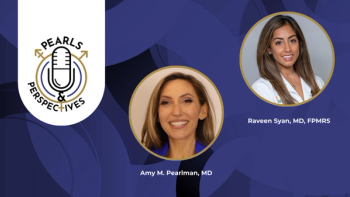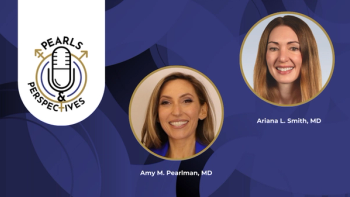
Intravesical Botulinum Toxin Type A in OAB Management: Expert Insights
Dr. Kennelly, Dr. Kevin Benson, and Dr. Karyn Eilber share their experiences in the use of intravesical botulinum toxin type A as a treatment option for overactive bladder (OAB) into treatment plans. They provide insight into identifying optimal candidates, the outcomes they have observed, and benefits and risks, including strategies for managing these risks. They explore the decision-making process in guiding patients through various treatment options, considering individual lifestyles and preferences.
Episodes in this series

Transcript:
Dr. Kennelly: And Dr. Eilber, one of the other therapies that you talked about was also botulinum toxin therapy. Can you tell me about how that mechanism of action is and a little bit about that treatment?
Dr. Eilber: I always like to explain it to my patients that if the overactive bladder medications are muscle relaxants my bladder Botox is kind of your ultimate relaxant if you will because it actually you know paralyzes muscles in a certain way. I think it's an easier sell maybe to my patient population because you know I'm here right in the heart of Los Angeles where you know it's used a lot. Cosmetically you know people are much more familiar than now because they also use a rather medical conditions like migraines. But that's probably the easiest way that I found to explain to people and also I think it's an Easier therapy for people to accept because even if they have every possible complication You know, it's going to wear away because it only lasts for a finite period of time
Dr. Kennelly: Yeah, so it seems like you know the awareness of it is certainly out there for all the other medical conditions that are there is. Does it last for a long time? Is it a one and done?
Dr. Eilber: Unfortunately, no. It falls somewhere in between, I guess, neuromodulation and medication. You're not taking it every day. On average, most people get response for six months. There are a few of my patients metabolize it for whatever reason very slowly and are lucky enough they comb like every 10 to 12 months. And there are people who, you know, every three months of the day have to have it done. But on average, it's about six months for most people.
Dr. Kennelly: So we have all these kind of options that are out there for patients. How do you help navigate patients through that? I mean, obviously they're coming to you, both as consultants, you manage and do all these therapies. How do you get them involved? Do they make the decision? Do you kind of help them? What do you do in your practice, Dr. Benson?
Dr. Benson: I'm not saying mentioned all of them, you know, I mean, in the conversation with every individual is so different. You know, I kind of try to ask patients priorities that they have, you kind of learn a little bit about their lifestyle, you learn about their background. And some of these are more nuanced and seem to make sense and fit better for different people for different reasons. So again, younger patients, neuromodulation is an excellent option. They've got a lot of years, they've got a lot going on, they don't want to be in. Perhaps a patient who has medical issues, has comorbidities is in a different spot, maybe Botox and just being able to lightly touch them and do something in the office is what they want. And there's 50 other considerations that go along with those. So these are just some basic things.
But usually, if you have a conversation on each of the therapies, patients select themselves pretty quickly towards one or the other. You know I don't find many that say, gosh, I have absolutely no preference either way. They'll definitely say, I kind of think this sounds more like me. And if this one doesn't work, can I still do that one? That's kind of what they'll say oftentimes. So it might be they want to start with Botox. And if they don't do well with it, they're saying, I'm open to neuromodulation. But let's try this first. Or they might say, if that thing can get me better for 10 years, I want to do that, and I don't want to do the Botox.
And I think one of the big things that Dr. Eilber said is, I view Botox as a paralyzing therapy, I view neuromodulation as a restorative therapy. So their mechanism of action is completely opposite. And so it really depends upon, again, are you thinking about sensory afferent upregulation, or are you thinking about it when you're-- spasm that you need to treat? And so I think of it the same way I think of, you know, which is going to fit that particular problem better. And the data shows that they both work for both, but maybe if you lean one way or the other, that might be a discriminator.
Dr. Kennelly: All right, so you bring up a good point. Actually, are these therapies mutually exclusive? If you do one, can you not do the other? Can you do together?
Dr Benson: Well, I don't know. think obviously the majority of people require both, but do I have patients in my practice to do both? Yes. And against the severity of the problem and how they respond to each thing, I also found some patients over time have migrated from one to the other. So even though they did well with Botox for a number of injections, even though it's every six months on average, they're like, you know what, I've been doing this for five years and maybe I want to try that. I just want to step out and do something different. I've had people that have had neuromodulation over time for - we don't understand, doesn't work as effectively, and we might switch them to Botox. And I have patients who synergistically use both and need both. So any of those scenarios is certainly possible.
*Video transcript is AI-generated and reviewed by Urology Times® editorial staff.
Newsletter
Stay current with the latest urology news and practice-changing insights — sign up now for the essential updates every urologist needs.






